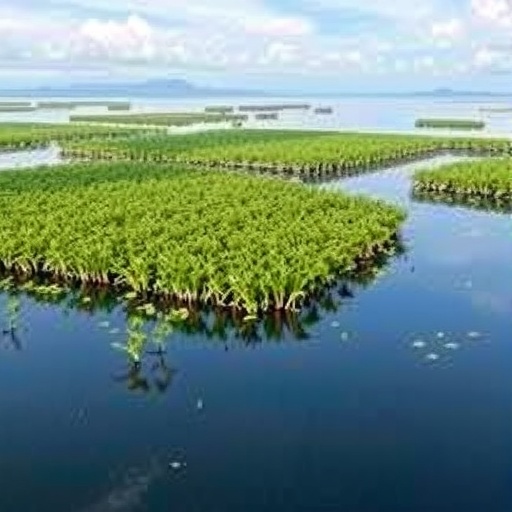Restored mangrove forests are emerging as vital players in the context of carbon sequestration, according to a comprehensive study focusing on Vietnamese mangroves dating back to the year 1900. As global climate concerns intensify, researchers are investigating how these ecosystems can serve as significant carbon stores, compensating for some of the carbon emissions attributable to human activities. However, this inquiry also raises questions about the capabilities and ecological functions of these restored mangrove environments.
The research highlights the crucial importance of sediment organic carbon storage within restored mangrove habitats, with a specific emphasis on how land-use changes over decades influence this carbon persistence. The mangroves have been observed to adapt unexpectedly in the face of changing environmental circumstances and land use. This poses a fascinating dichotomy; while they may store significant carbon, the ongoing shifts may prevent them from functioning as they did in their natural state.
Mangroves play an undeniable role in carbon cycling and storage, due to their unique ability to sequester carbon in their biomass and the sediment beneath them. Unlike many terrestrial ecosystems, mangroves possess the capability to thrive in saline environments, leading them to be one of the most productive types of coastal ecosystems. The anaerobic conditions often found in waterlogged soils inhibit the decomposition of organic material, thus allowing for a build-up of carbon over time. This makes them critical in the fight against climate change, as they not only capture carbon from the atmosphere but also store it in a form that remains locked away for extensive periods.
The study led by a team of researchers from Sweden, China, Vietnam, and the United Kingdom aims to delve deeper into how various factors—such as agricultural practices and industrial development—have influenced the ecological dynamics of mangrove forests. Over the years, a notable trend has emerged indicating that restored mangroves, often initiated to compensate for environmental degradation, do not always replicate the inherent ecological functions exhibited by their natural predecessors. This raises significant questions regarding the methodologies employed in restoration projects, suggesting that they might necessitate further refinement to truly restore the ecological balance.
As land use patterns evolve, it becomes imperative to investigate how these shifts affect not only carbon storage but also the broader ecological functions that mangroves support. Traditional understanding posits that the re-establishment of mangrove forests would reinstate the full spectrum of functions—such as habitat provision for diverse species, coastal protection from erosion, and water filtration capabilities—that naturally occurring forests provide. However, the reality may be more complex. The study showcases that restored mangroves may be locked into a certain state of function that doesn’t allow for the same biodiversity and productivity as original, undisturbed forests.
The implications for conservationists and policymakers are substantial. Strategies that emphasize merely planting mangroves without a comprehensive understanding of their historical ecology may not yield the anticipated results. Instead, a more holistic approach that takes into account the original ecological parameters and biodiversity of the region is necessary for successful restoration efforts. By focusing on these aspects, restoration projects can achieve better outcomes, helping to develop mangrove ecosystems that are not just good at sequestering carbon but also vibrant and diverse habitats.
Additionally, ongoing research is essential to monitor the changes within mangrove ecosystems over extended periods. By engaging in long-term observational studies, researchers can gather invaluable data that would facilitate a better understanding of how these ecosystems respond to environmental stressors and anthropogenic impacts. Such insights could fortify the strategies’ efficacy aimed at addressing carbon dioxide emissions while simultaneously preserving critical coastal habitats.
The study underscores the collaborative nature of environmental research, drawing insights from various global locations and scientific expertise. This multidisciplinary approach fosters innovation, encouraging new ideas and methodologies to be brought to light. Learning from diverse ecological settings allows researchers to form a more integrated understanding of mangrove ecosystems, suited better for facing future climate challenges.
Furthermore, funding and investment in further research play a key role in sustaining these ecological investigations. The support from organizations like the Global Challenges Research Fund and the Swedish Research Council showcases a commitment not only to academic inquiry but also to addressing real-world challenges faced by communities worldwide due to climate change. Mobilizing resources toward enhancing the resilience of mangrove ecosystems is vital for global efforts geared at climate mitigation.
In conclusion, while restored mangrove forests hold promise as significant carbon stores, the complexities surrounding their ecological functionalities cannot be ignored. As our understanding of these delicate ecosystems grows, it becomes increasingly clear that effective restoration will require more than merely planting trees; it necessitates a fundamental shift in how we approach mangrove conservation and restoration. Moving beyond carbon metrics to assess the full ecological spectrum will enrich restoration efforts and contribute to healthier coastal environments, ultimately benefiting ecosystems and human communities alike.
Subject of Research: Not applicable
Article Title: Land use change drives decadal-scale persistence of sediment organic carbon storage of restored mangrove
News Publication Date: October 2023
Web References: PLOS Sustainability and Transformation
References: Not applicable
Image Credits: Credit: Heidi Burdett (CC-BY 4.0)
Keywords
Mangroves, Carbon Sequestration, Ecosystem Restoration, Climate Change, Sustainable Land Use, Biodiversity




